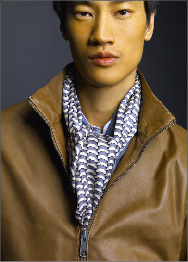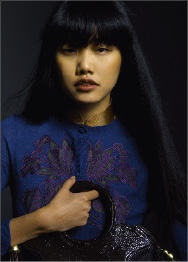- Home
- Media Kit
- Current Issue
- Past Issues
- Ad Specs-Submission
- Ad Print Settings
- Reprints (PDF)
- Photo Specifications (PDF)
- Contact Us

![]()
ONLINE

An Ambassador of Style
Editors’ Note
Raphael le Masne de Chermont has maintained his current post since September 2001. Prior to coming to Shanghai Tang, le Masne de Chermont held executive-level positions at brands within the Richemont Luxury Group: Piaget, Baume & Mercier, Officine Panerai, and Cartier, where he first joined its London operations in January 1988. He is a graduate of l’Ecole Supérieure de Commerce de Nantes Atlantique, France.
Company Brief
Hong Kong-based Shanghai Tang (www.shanghaitang.com) is the first and leading luxury lifestyle brand from China. Since its inception in 1994, it has advanced the expression of modern Chinese chic by fusing current design concepts with innovative Chinese-inspired elements. Offering ready-to-wear for men, women, and children, as well as accessories and housewares, Shanghai Tang supports an international network of 30 boutiques in the world’s most prestigious shopping districts.
Are you happy with Shanghai Tang’s brand awareness? What are your plans to continue building brand recognition?
Our mission at Shanghai Tang is to provide a modern vision of China. As China becomes a main economic superpower and center of high-end production, it needs an ambassador of style, which is what we are. We have strong brand awareness in Asia, and we’re slowly entering U.S. and European markets. In the past five or six years, we have rebranded Shanghai Tang, working from a very strong Chinese-rooted concept and applying a modern approach to developing a lifestyle brand.
How broad is the product line today?
We are a lifestyle brand like Ralph Lauren is for America. We cover ready-to-wear for men, women, and children, as well as accessories and home furnishings. We also develop concepts like Shanghai Tang Café, and we are considering a boutique hotel concept. The brand can bear this kind of approach because it’s a strong, colorful, highly identified brand.

Is the opportunity to make luxury products in China truly understood?
What matters is the design, material, and skill; it doesn’t matter where it’s produced. Since day one, we’ve proudly produced in China. People looked down on us, saying you can’t be luxurious if you’re in China. Today, it’s not a problem, and slowly and discreetly, many European luxury brands have started producing in China. We’re going in the right direction in terms of quality and production in China. There’s pressure on the currency, making the cost of production higher in China. There’s also demand from the Central Government of China on factories to be more supportive of their employees. So the cost of production in China has gone up between 15 and 30 percent in the past year, which means some factories close down while prevailing factories focus on quality, branding, and added value.
Is this a niche market, or do you see a broader target for the brand?
We are a lifestyle brand with small brand awareness in most parts of the world. We have 30 boutiques, mainly in Asia plus New York, Hawaii, Miami, Paris, London, and Dubai. In terms of revenue, however, we are not small at all. We are trading at a level many brands would envy. We have the potential to grow pretty big, but we don’t want to be everywhere.
How have you been able to produce quality at reasonable price points?
By producing in China, we have a lot of flexibility. Our edifice is in Hong Kong, with the factories just next to it. We can get a sample within 24 hours. We control our production and quality. We import fabrics when we can’t get the fabric in China, and we make sure we work with the best weavers. We can afford to sell at a lower price because the cost of labor here is much cheaper than in America or Europe.
Is there coordination between brands at Richemont?
We are independent. We work with the board on the DNA of the brand, but they give us full autonomy. Once a year we meet to come up with a plan, and we meet again at the end of the year to look at results. If we need something, of course they will back us up, and they have in the past.
Has the term luxury lost some of its meaning? Is it hard to define what luxury really is?
For me, luxury is a very special pleasure that makes your life brighter. It can be a pair of shoes, a smile, anything. The business of luxury is really creating a dream, adding value, and providing pleasure. A custom-made sweater from Shanghai Tang with a silk lining inside can be pure luxury.
When Richemont came to you with this opportunity, did you know right away it was a good fit?
Richemont is a wonderful group because it gives you an opportunity to have very interesting experiences around the world. In coming to Shanghai Tang, I took a career risk, but it was worth it. My vision was to build the first Chinese luxury brand. The vibe in Asia was exciting, and I wanted to stay and give it a try. I’m happy I did.

Images from the Fall-Winter 2008
Shanghai Tang catalog
Did your employees come onboard and understand your vision?
The brand was under stress. It was not performing very well. Morale was pretty low. I had to rebuild that. What I usually do when I get into a company is clean it quickly, because afterward it is difficult. So that’s what I did.
Is it challenging to retain people in retail?
It is too early to say – we’re starting with a new team. A good retail manager is a very valuable asset. You cannot save money on that, because that person brings success. I have to have an A team. So that’s what we’re building now.
How challenging is it to turn the business off? Have you learned how to get away from it?
I have to. I have two wonderful kids whom I don’t see very often, so when I’m at home, I need to disconnect. I try to spend quality time with my children, which is very important. But it’s great to be in love with what you do because you wake up excited every morning. It’s a little bit overwhelming, but I’m happy. We have the right balance.